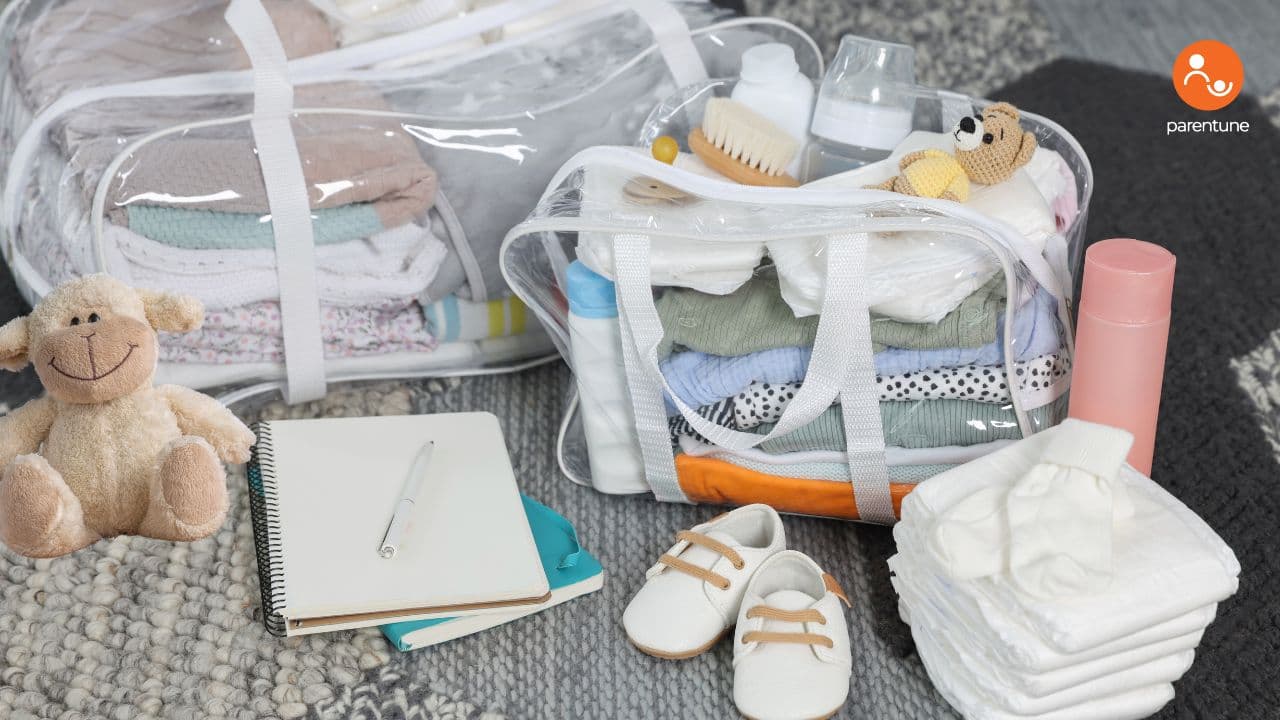daily-tips
What To Pack In A Hospital Bag: The Ultimate Delivery Checklist

Published: 22/07/25
Updated: 22/07/25
Birth doesn’t wait for packing. Be ready before the first contraction.
It’s 2 AM. Your water just broke.
Do you want to scramble through drawers in a panic—or reach calmly for a ready-to-go hospital bag?
Packing a hospital bag isn’t just a task. It’s a mindset shift. It says, I’m ready. It’s your first real prep move from expecting a baby to welcoming one.
But what actually needs to go in?
That’s where most lists fall short. They give you everything—but don’t tell you why. So let’s rethink it.
Doctor Q&As from Parents like you
Let’s pack like someone who understands what labor feels like.
Let’s pack like you’re prepping for both chaos and comfort.

When Should You Pack Your Hospital Bag?
The short answer: by 36 weeks.
But here’s the longer truth—babies run on their own clock. First-time moms often deliver later, but second (and third) babies? They’re early birds.
Packing early is not superstition. It’s sanity.
You want time to:
-
Test which nursing bras fit (comfortably)
-
Wash the newborn clothes in mild detergent
-
Figure out if that Bluetooth speaker actually calms you down
Packing late doesn’t make you cool. It just makes you tired.
More related blogs:
The Delivery Bag Isn’t One Bag. It’s Three.
This is the first secret no one tells you.
You don’t just need a hospital bag. You need three small ones (or zipped compartments inside a big one):
-
Mom’s Labor + Recovery Bag
-
Baby’s Essentials Bag
-
Partner/Support Person’s Kit
Why three?
Because digging through baby wipes to find your lip balm during a contraction is not ideal.
Let’s unpack each one.
1. What To Pack In Your Hospital Bag (Labor + Recovery)
This is your personal headquarters. Think comfort, dignity, and control.
Essentials (Don’t Skip These)
-
Government ID + hospital documents
-
Birth plan (printed + digital)
-
Insurance papers (if applicable)
-
Phone + charger (long cable preferred)
-
Folder for baby’s paperwork/discharge instructions
Comfort During Labor
-
Loose, front-open gown or labor dress
-
Lip balm (trust us: hospital air is dry)
-
Hair ties or a headband
-
Warm socks or slippers (non-slip is best)
-
Eye mask or earplugs (especially in shared rooms)
-
A small towel (your face will sweat more than expected)
Emotional Anchors
-
Your playlist or calming music
-
A photo, affirmation card, or scent that grounds you
-
Birth ball (if hospital allows)
-
Rebozo or scarf for labor support
Post-Delivery Recovery
-
Nursing bras/tanks (2–3)
-
Full-coverage underwear (dark cotton or disposable)
-
Maternity pads (hospital ones are often bulky)
-
Toiletries (face wash, toothbrush, dry shampoo)
-
A comfortable going-home outfit (loose, stretchable)
Optional but helpful:
-
Nipple cream
-
Peri bottle (if hospital doesn’t provide)
-
Postpartum cooling pads or witch hazel wipes
A good hospital bag feels like you’re packing for both battle and retreat.
2. What To Pack For The Baby (Tiny Human Essentials)
Babies arrive with zero possessions. Everything they touch first is what you packed.
Clothing
-
2–3 full-sleeve onesies or sleep suit
-
2 cotton caps + mittens
-
2 pairs of socks
-
1 swaddle or baby blanket
-
Going-home outfit (soft, weather-appropriate)
Hygiene
-
Newborn diapers (5–6)
-
Wipes (hypoallergenic)
-
Burp cloth or soft towel
-
Baby nail file or mittens (to avoid scratches)
Optional
-
Baby lotion or oil (only if advised)
-
Nasal aspirator (some babies need it from day one)
Parentune Tip: Avoid overdressing the baby. Layer, but don’t overheat. Newborns can’t regulate temperature easily.
3. What Your Partner Or Support Person Needs
They’re your anchor—and anchors need tools too.
-
Snacks (for both of you)
-
Water bottle
-
Change of clothes
-
Toiletries (especially if they’ll stay overnight)
-
Eye mask, pillow, and small blanket
-
List of people to update after birth
-
Book, charger, entertainment (labour can take hours)
Their job isn’t just holding your hand. It’s holding the entire emotional space. Let them pack for that.

What Not To Pack
Because space is sacred when time is tight.
-
Jewelry or valuables (things get misplaced easily)
-
Perfumed cosmetics (strong smells may irritate)
-
Pre-pregnancy clothes (they won’t fit right after birth)
-
Breast pump (most hospitals provide one if needed)
-
Fancy baby clothes (comfort > photo ops)
Don’t let your hospital bag turn into a suitcase of guilt. Keep it functional.
Why A Well-Packed Bag Changes The Game
A good hospital bag does three things:
-
Minimizes mental clutter
You won’t need to make micro-decisions mid-contraction. -
Supports faster recovery
When you have what you need—pads that fit, clothes that don’t itch—you heal better. -
Signals confidence
To the hospital staff. To your partner. To yourself.
In a moment where so much is unknown, your bag is known.
The Parentune Perspective
At Parentune, we’ve heard from thousands of mothers who say:
“I wish someone had told me the real things to pack.”
Which is why we created this list—not just from clinical checklists, but community wisdom. Stories from moms, doulas, dads, and nurses who’ve been there.
And when you join the Parentune community, you don’t just get a checklist—you get solidarity.
Final Thought: Don’t Pack Fear. Pack Trust.
Your hospital bag won’t decide how your labor unfolds.
But it will decide whether you feel ready, calm, and cared for through it.
So pack wisely.
Pack like you’re not just expecting a baby—but preparing to meet them
Be the first to support
Be the first to share
Related Blogs & Vlogs
No related events found.

